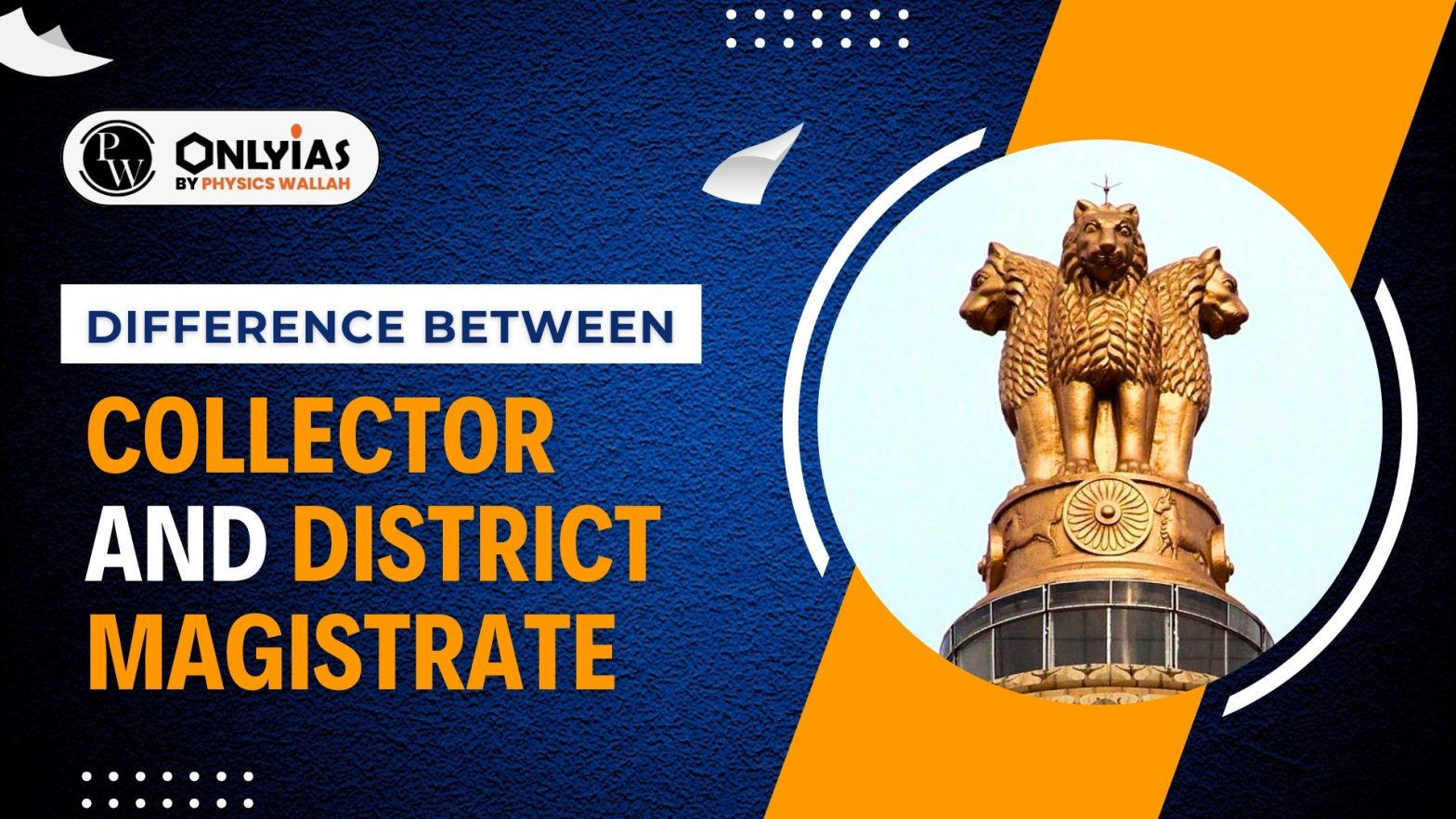Difference Between Collector and District Magistrate is provided here. Learn more about their responsibilities and roles here.

Difference Between Collector and District Magistrate: In India, the roles of a District Collector and District Magistrate are highly significant in managing a district’s administration and law enforcement. However, these terms are often used interchangeably, confusing whether they refer to the same position or different roles. This article explains the difference between a Collector and a District Magistrate, their responsibilities, and the qualifications required to become a District Collector.
The District Collector and District Magistrate are two distinct titles often held by the same individual in a district. However, the responsibilities associated with each title vary slightly, focusing on different administrative aspects. Understanding this difference is essential for UPSC aspirants and anyone interested in public administration roles.
The difference between Collector and District Magistrate reflects a combination of administrative and judicial functions vital to a district’s operations. Although the titles are often used synonymously, the difference between Collector and District Magistrate lies in their functional areas:
|
Difference Between Collector and District Magistrate |
||
| Aspect | District Collector | District Magistrate |
| Primary Function | Oversees revenue collection and land administration | Ensures law and order and public safety |
| Key Responsibilities | Collects land revenue, government taxes, and fees; maintains accurate land records; appoints revenue staff | Supervises police and Executive Magistrates; manages jails; oversees public safety during emergencies |
| Role in Emergencies | Manages disaster response and relief efforts | Maintains law and order and public safety during crises, other officials |
| Authority Over | Revenue officers, land administration teams | Law enforcement agencies, police |
| Reports to | Revenue Department via the Divisional Commissioner and Financial Commissioner, Revenue | Home Department of the State Government |
| Legal Functions | Acts as the highest revenue authority in a district; handles land-related disputes | Implements and enforces judicial orders and oversees criminal administration |
| Election Role | Limited (oversees revenue during elections) | Ensures free and fair elections; acts as District Election Officer and Returning Officer for Lok Sabha elections |
While the District Collector and District Magistrate titles refer to distinct responsibilities, they are typically held by the same individual. The same person thus performs dual functions within the district administration.
Key Points:
To become a District Collector in India, you must clear the Civil Services Examination (CSE) conducted by the Union Public Service Commission (UPSC). This is one of the most competitive exams in the country, and successful candidates join the Indian Administrative Service (IAS) or State Administrative Services, eventually becoming eligible for the position of Collector.
Steps to Becoming a District Collector:
Becoming a District Collector requires academic qualifications, administrative skills, and dedicated preparation for the UPSC CSE. Here’s what you need:
| Qualification | Details |
| Educational Qualification | Bachelor’s degree in any discipline from a recognized university |
| Age Limit | 21 to 32 years (relaxations for specific categories) |
| Exam Required | Civil Services Examination (UPSC) |
| Other Requirements | Citizenship of India |
Becoming a Collector is challenging and requires a blend of academic knowledge, dedication, and perseverance. The journey from clearing UPSC CSE to becoming a District Collector gradually involves promotions and evaluations.
As a District Collector and Magistrate, an IAS officer has a wide range of responsibilities to ensure the district’s smooth functioning.
Although the District Collector and District Magistrate roles overlap regarding responsibilities, their powers and focus areas vary. The Collector primarily deals with administrative and revenue functions, while the Magistrate concentrates on law enforcement.
Role
Authority
Focus Area
District Collector
Revenue collection, land records, government schemes
Administrative governance
District Magistrate
Law enforcement, police oversight, judicial powers
Public safety and order
These combined roles contribute significantly to district governance and overall public welfare, making the IAS officers one of the most critical administrative figures.
Sign up for the PWOnlyIAS Online Course by Physics Wallah and start your journey to IAS success today!
UPSC Exam 2025 Related Articles
UPSC Prelims 2025 Exam
UPSC Notification 2025
UPSC Preparation 2025
UPSC Eligibility 2025
UPSC Exam Pattern
UPSC Syllabus
The District Collector mainly focuses on revenue and land administration, while the District Magistrate is responsible for maintaining law and order.
Yes, both titles are typically held by the same individual, who performs dual roles within district administration.
The Civil Services Examination (CSE) conducted by UPSC is required to enter the Indian Administrative Service (IAS) and become eligible for the position.
A bachelor’s degree from a recognized university and successful completion of the UPSC CSE are necessary qualifications to become a District Collector.
The District Magistrate coordinates relief efforts, manages emergency response, and ensures public safety during disasters.
<div class="new-fform">
</div>